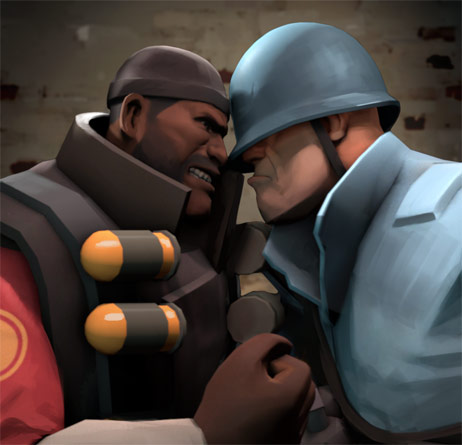Having recently come into possession of something I can only classify as a “gaming PC”, I realize it would be silly to own this thing and not use it to actually play games. Certainly it is very capable of doing my usual Facebook and blogging updates, but it is capable of so much more. However, I also remember quite clearly that it was not a lack of hardware that has turned me into a near exclusive console gamer in the past few years. I’ve still played the occassional PC game, but only as a rare foray since the PC was the obvious or only platform of choice.
Powerful hardware or not, I will turn this machine back around and make it some of the most powerful hardware used to poke people on Facebook if the PC gaming industry doesn’t start to shape up. I’m willing to be enticed away from consoles again, but here is what it will take to get me back as a regular PC gamer.
1. Your game will install easily and work the first time
I am sick and tired of installing games that don’t work, that want me to update my drivers, or doesn’t actually run on hardware that the box claims it supported. I dealt with the old days of trying to switch between expanded and extended memory and constantly trying to keep from getting the two mixed up. Oh how I would love to go back to that problem compared the what the average install has become. In the past two years I have had more games with install problems than not. If anything it seems like this is getting worse. PC games are not a new phenomenon, this should not be hard! Your chief competitor only requires someone to pop in a disc and start playing. I’m not asking for that level of simplicity, but I think asking for an install process that works is not unreasonable. These are games, not enterprise level business applications.
2. You will design games for systems people actually own
I hate the claim “The PC is the largest platform base”. It’s not true because there is so much hardware and operating system variation that is lumped in under “PC”. Laptops typically have integrated graphic cards that are nowhere near the capabilities of what is inside a dedicated desktop gaming computer. Somewhere along the way you must make a business decision as to what kind of market you will support. I hate to point this out, but more and more people are going the laptop route, which means you desperately need to figure out how to support those “lousy” integrated graphic cards or lose a huge chunk of your market.
3. Your copy protection will not keep me from playing the game
I paid money for your product. I kept my end of the bargain. Your end of the bargain is to give me the product you advertised. When I can’t play your game because your stupid copy protection scheme has some issue with my system settings, chosen install location, or some random occurrence based on the position of the stars we have a problem. If I can’t get my money back, chances are good I will not buy a game from you again. Even if I can get my money back, the process of trying to return software is so egregious that I’m unlikely to risk putting money down on your products in the future.
4. Your copy protection scheme must have no impact on the game
I often hear claims about how cracked games have often run better because they’re not running the copy protection software in the background. I’m willing to let that go as hearsay evidence at best, but I also know enough about software to understand those claims are entirely plausible. If your copy protection is making the pirated version of your product the superior choice then you’ve created a self-defeating process. If I see system processes kicking off in conjunction with performance problems while running the game, it won’t take much for me to figure out if its some stupid scheme you’ve got running in the background. If this happens I will avoid your products in the future.
5. You will not treat your customers like criminals
Call me old fashioned, but I prefer physical media and I don’t mind a bit having the disc in the DVD-ROM while playing even if the game is entirely installed on the hard drive. That said, if I own authentic physical media then we should be done. I should not have to verify my identity, be forced to register, or do anything that involves some external process to prove that I paid for the game. This is a huge public relations problem. We already live in a world were many valuable products are locked away until some underpaid struggling college student comes to unlock it for us. We go through security scanners, have security tags removed, and receipts verified all too often for my comfort. When I get home I feel like my domain is sacred. Having your product then come up and ask for identification is a slap in the face.
6. I should not have to mod your game to make it playable
I do not pay for unfinished software. Every piece of software has bugs, every piece of software has issues. The more complex it is, the more problems it has. See, I get it. I’ve been in software development for over a decade. I know what you go through to get a product to market. I do. However, there is a reasonable level of expectation that says I am buying a finished product that will work as advertised. In my world that’s “works as documented”, but it’s the same thing. We don’t want bugs in software, they’re just nearly impossible to avoid. I hate it when I complain about a game and the first response is “You need to download mod [X]”. WRONG! I paid for the game, I installed it, I may have gone through who knows how many convolutions already just to get to this point. Now I have to go spend additional effort researching, downloading, and installing something else? Probably something being offered for free? Mods are not a crutch and should not be required. Having mod support is a nice feature, but the average Joe and Jane are not going to do anything further to your software. Instead they will just perceive an inferior product. As for me, the not-so-average Joe, what I see is a poor effort turned in with expectations of access to my wallet. I have every right to be offended.
7. Your game should not crash at random
Games crash. Software crashes. Even some console games have the occasional glitch. Like I said before, every piece of software has bugs. Even knowing that, you should have a graceful way of handling errors. You desperately need to address memory leaks and not just hope the game’s garbage collection handles it before it crashes, assuming you even bothered to do enough memory management to actually implement garbage collection. It’s one thing to have a workaround to a problem, it’s an entirely different matter to suddenly find yourself back at the desktop for no reason. That doesn’t feel good to the consumer, especially if they were in the midst of an epic battle.
In short, what I’m saying is that your product needs to be usable. I need to be able to judge a game based on how well it plays. Unfortunately, I’m having to surmount many obstacles just getting to the point of being able to even play the game. By that time I’ve already soured on your product. I used to enjoy PC gaming, but what turned me off wasn’t the increasing abilities of consoles but the passive-aggressive attitudes of PC game developers towards their customers, a constant refusal to adapt to the market, and increasing difficulty in actually getting games to work on hardware that was fairly standard.
If you want to call yourself a PC game developer then quit treating your customers like the enemy and give them the products they paid for. That doesn’t seem like too much to ask.





